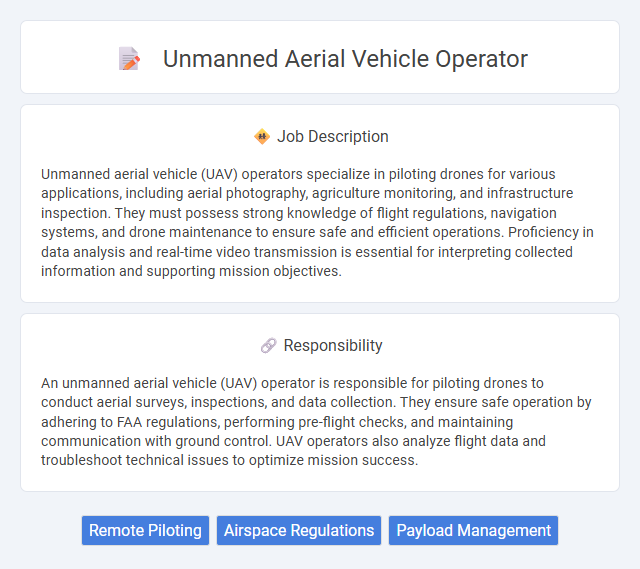
Unmanned aerial vehicle (UAV) operators specialize in piloting drones for various applications, including aerial photography, agriculture monitoring, and infrastructure inspection. They must possess strong knowledge of flight regulations, navigation systems, and drone maintenance to ensure safe and efficient operations. Proficiency in data analysis and real-time video transmission is essential for interpreting collected information and supporting mission objectives.
Individuals with strong technical skills, good hand-eye coordination, and the ability to remain calm under pressure are likely more suited for a career as an unmanned aerial vehicle operator. People who prefer working independently and have an interest in aviation or technology may find this job more compatible with their strengths and interests. Those who struggle with prolonged focus or have difficulty interpreting technical data might face challenges adapting to the demands of this role.
Qualification
Unmanned aerial vehicle (UAV) operators must possess a valid remote pilot certificate issued by aviation authorities such as the FAA. Essential qualifications include proficiency in operating drone systems, knowledge of airspace regulations, and expertise in flight planning and safety protocols. Strong technical skills, attention to detail, and the ability to analyze aerial data are critical for successful mission execution.
Responsibility
An unmanned aerial vehicle (UAV) operator is responsible for piloting drones to conduct aerial surveys, inspections, and data collection. They ensure safe operation by adhering to FAA regulations, performing pre-flight checks, and maintaining communication with ground control. UAV operators also analyze flight data and troubleshoot technical issues to optimize mission success.
Benefit
Operating unmanned aerial vehicles (UAVs) likely offers benefits such as enhanced career growth due to the increasing demand for drone technology across industries. The role probably provides opportunities to work with cutting-edge equipment and gain specialized technical skills, which may improve job security. Operators might also experience flexible work environments and competitive salaries as the UAV sector expands.
Challenge
Operating unmanned aerial vehicles (UAVs) likely presents challenges related to navigating complex airspace regulations and ensuring precise control under varying weather conditions. The operator probably faces the risk of technical malfunctions or communication signal loss, requiring quick problem-solving skills. Managing data collection and maintaining safety protocols in dynamic environments may also contribute to the demanding nature of this role.
Career Advancement
A career as an unmanned aerial vehicle (UAV) operator offers significant advancement opportunities through certification upgrades, specialized training, and gaining experience in diverse sectors such as agriculture, defense, and surveying. Operators can progress to roles like UAV pilot supervisor, drone program manager, or aviation safety inspector by mastering advanced flight techniques, data analysis, and regulatory compliance. Leveraging expertise in emerging drone technologies and geographic information systems (GIS) enhances prospects for leadership positions and higher earning potential.
Key Terms
Remote Piloting
Remote piloting of unmanned aerial vehicles (UAVs) requires precision in controlling aircraft systems and real-time adaptation to environmental changes, ensuring mission success across surveillance, agriculture, and delivery sectors. Operators utilize advanced flight control software and GPS navigation to execute complex flight paths while maintaining compliance with aviation regulations and safety standards. Mastery of remote piloting technologies enhances operational efficiency and expands the applications of UAVs in various commercial and industrial domains.
Airspace Regulations
An Unmanned Aerial Vehicle (UAV) operator must have in-depth knowledge of airspace regulations set by aviation authorities such as the FAA or EASA to ensure safe drone operations. Compliance with guidelines on restricted zones, flight altitude limits, and no-fly areas is critical for avoiding legal penalties and maintaining operational safety. Staying updated on changing regulations and obtaining necessary certifications is essential for professional UAV operators working in commercial and recreational sectors.
Payload Management
Unmanned aerial vehicle (UAV) operators specializing in payload management are responsible for selecting, configuring, and maintaining mission-specific equipment such as cameras, sensors, and communication devices. Precision in payload integration directly impacts data accuracy and mission success in industries like agriculture, surveying, and defense. Expertise in real-time payload adjustments and troubleshooting enhances UAV performance and operational efficiency.
 kuljobs.com
kuljobs.com